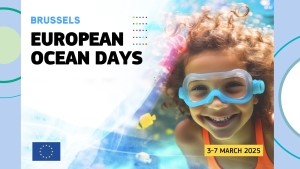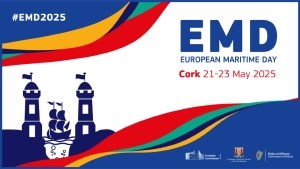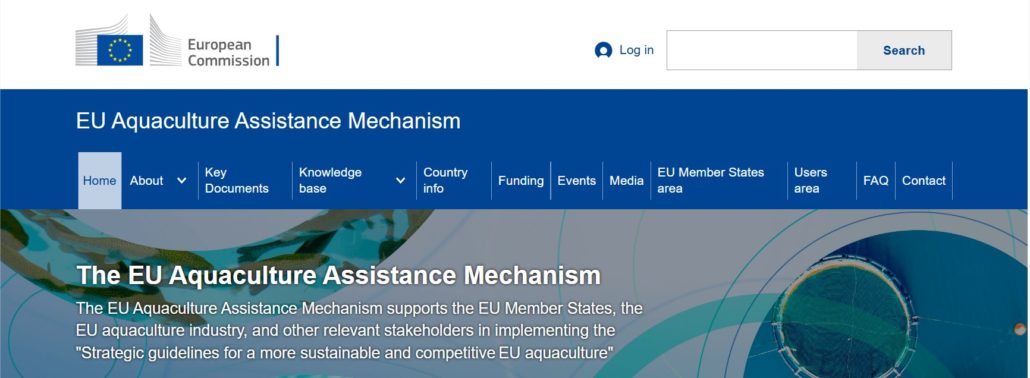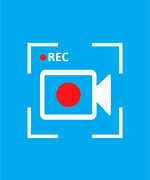EU Aquaculture Assistance Mechanism
/in AAM, EU, European Commission /by EATIPWe are pleased to share with you the latest developments of the
EU Aquaculture Assistance Mechanism websites and some important upcoming events.
Read the online version here
Leveraging European Technology Platforms to boost Europe’s public and private R&I outcomes
/in ETPs, EU /by EATIPEATiP is proud to join seventeen other European Technology Platforms (ETPs) in calling on the European Commission to reaffirm its support for the strategic role that ETPs play in the next European Framework Programme (FP10).
Through development of our Strategic Research & Innovation Agenda platforms such as EATiP have contributed to the definition of crucial R&I priorities, including those under the EU and national Framework Programmes. One of the main benefits of multi-actor Technology & Innovation Platforms is our ability to provide wide, objective, coherent and strategic advice that replaces reliance on multiple, often competing and contradictory, points of view.
We firmly believe that the role of ETPs remains vital: ensuring that EU research has a high impact and that results are leveraged for the benefit of both industry and society as a whole. This compliments the high level recommendations coming from key reports such as the Draghi Report and Align, Act, Accelerate – the report of the Expert Committee on Research, Technology & Innovation to boost European Competitiveness. This key role of ETPs was further highlighted in the EU Council conclusions (May 2024) on “A competitive European industry driving our green, digital and resilient future”, the EU’s R&I does not sufficiently translate into marketable products or services. ETPs play an important role in helping bridge this gap, given our strong networks of experts and sectoral expertise.
As the new European Commission continues to take shape, EATiP and other bio-economy allies will continue in our making representations on priorities for research and innovation actions – alongside the need for the concerns of industry being prioritised.
EU Aquaculture Assistance Mechanism: What’s new?
/in AAM, EU, European Commission /by EATIPPlease find the latest developments of the EU Aquaculture Assistance Mechanism website in this September 2024 Newsletter.
In this issue, you will find policy updates and highlights from the knowledge base. You will also discover more about the recent outputs produced by the AAM: an e-learning module based on the European Commission Staff Working Document ‘Regulatory and administrative framework for aquaculture’, as well as three new infographics and a video on the Open Method of Coordination in EU aquaculture policy. Don’t miss the upcoming events taking place in Scotland, Portugal and France, as well as more information on the aquaculture sector in Lithuania.
Do you have any comments, questions, or suggestions for future content of this newsletter? Don’t hesitate to reach out : mare-aquaculture-support@ec.europa.eu. You can also subscribe here
More on the EU Aquaculture Assistance Mechanism website below:
OLAMUR – a new EU funded project addressing aquaculture and renewable energy.
/in EU, European Commission, OLAMUR, Projects /by David BassettEATiP are delighted to be participating in a new EU Mission Ocean Lighthouse project, considering the integration of aquaculture production with renewable wind energy in marine multi use sites.
The OLAMUR project, running from January 2023 to December 2026 will engage 25 partners across European industry and research organisations who will work together to farm kelp and mussels at three pilot sites in Europe: two existing offshore wind farms and one fish farm that produces rainbow trout.
The Institute of Marine Research (IMR) in Norway is leading the project, whilst EATiP will take responsibility for leading on communication and dissemination activities.
The offshore wind farm Kriegers Flak in Kattegat is operated by the swedish company and project partner Vattenfall. This is one of the sites for kelp, mussels and artifical reefs. Photo: Vattenfall
The project is due to receive total European Union funding of €8,2 million over the course of the four year project duration.
“The OLAMUR project is a prime example of the way we have to work to solve the big problems of our time. It is not only an interdisciplinary, international scientific effort, but a lighthouse project which is set to provide specific, sustainable solutions for actual industries – today”, noted Nils Gunnar Kvamstø, Director of IMR, during his welcome address to project partners at a kick off meeting hosted by IMR in Bergen, Norway. “In this case, how can you combine energy production and sustainable food production, while perhaps also providing services to the ecosystem?”
The project will investigate several aspects of this, such as:
- Practical solutions to the challenge of farming in exposed offshore environments.
- Will the kelp/bivalves produced be safe to eat? (For example, concerns have been expressed about microplastics and hydraulic fluid from wind turbines)
- Potential carbon storage and habitat enhancement from farming kelp/bivalves.
- Legislation and regulation (including considering bureaucratic barriers to co-location and MSP?)
- In practice, wind farms can act as reserves for fish and other animals, since fishing is prohibited – can this type of reserve benefit some species, fisheries and aquatic ecosystems?
- Can we improve the habitat for fish and other animals by creating artificial reefs there?
As a “lighthouse” project the work will contribution to a number of EU policy priorities including working towards the 2030 Mission Ocean goal of restoring oceans and waters through research, innovation and blue investment.
The project is based in the Baltic basin, but seeks to benefit other EU and international basins through knowledge and innovation transfer. In many states, the offshore wind industry and marine multi use sites are only in the early stages of development. The project will also contribute in discussions surrounding the increasing emphasis on Marine Spatial Planning and engage with the EU MSP Platform.
The project partners in the various work packages are now in the planning process. Project partners include:
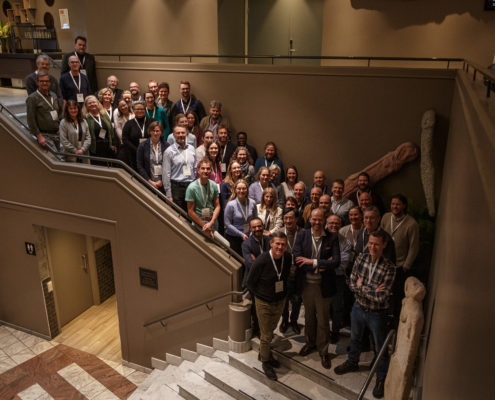
Project parnters attending the project kick off meeting in Bergen, Norway in January 2023. (Photo: Erlend A. Lorentzen / IMR)
- The Institute of Marine Research
- Alfred Wegener Institute Helmholtz Centre for Polar and Marine Research
- Danmarks Meteorologiske Institut
- Aarhus Universitet
- GCF – Global Climate Forum EV
- Helmholtz-Zentrum Hereon
- Maritime Robotics AS
- Vattenfall Europe Windkraft AS
- Kattegatcentrets Driftsfond
- Skarv Technologies AS
- SINTEF Ocean AS
- WindMW GmbH
- Kerteminde Seafarm Aps
- Lerøy Seafood Group ASA
- RedStorm OÜ
- Tartu Ulikool
- Danmarks Tekniske Universitet
- Ösel Aquafarm OÜ
- Köbenhavns Universitet
- Stiftelsen Voice of the Ocean
- ETT Spa
- Klaipedos Universitetas
- EATiP ASBL
- Nordfriesische Seemuschel GmbH
- Wyk 8 Muschelfischereibetrieb GmbH
At the pilot facilities in Denmark and Estonia, equipment will probably be put into the sea this year, with Germany following in 2024.
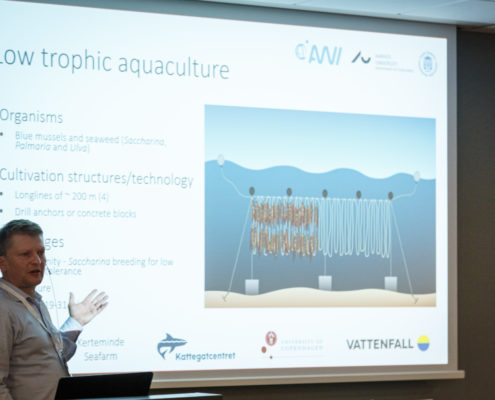
”There are no off the shelf solutions for the type of aquaculture we are about to do. We have to develop the solutions from scratch, tailored to meet the local conditions” – Bela H. Buck, Professor at the German Alfred Wegener Instiute, leading the work package which looks at the farming itself. (Photo: Erlend A. Lorentzen / IMR)
Project communication and dissemination tools are currently being developed including a project website, communication and dissemination plan and social media contacts. Look out for futher details coming soon! Please see here for further contact details on the project.
Innovation Forum at Aquaculture Europe 2022
/in _, AQUAEXCEL3.0, EATIP Forum, EU, European Commission, Events, Projects /by Catherine PonsThe European Aquaculture Technology and Innovation Platform, the European Commission and the European Aquaculture Society organised on Thursday, September 29, at Aquaculture Europe 2022, Rimini the :

Aquaculture Europe 2022 Innovation Forum
“From Policy to Solutions”
Creating the correct circumstances for the successful uptake of innovation solutions across aquaculture value chains benefits from a methodological approach considering industry needs alongside strategic political and policy objectives, coupled with an understanding of appropriate delivery vehicles. Multiple knowledge transfer and facilitation routes, including platforms, projects, accelerators, and dissemination/education tools all have a key role to play in effective innovation transfer and capacity building.
The AE2022 Innovation Forum aimed at industry actors, policy makers, knowledge transfer experts, and those engaging in aquaculture knowledge development and collaboration, to inform how best to ensure meaningful knowledge & innovation transfer addressing research gaps and priorities for action whilst ensuring impact.
10:30 to 11:30 Part I. The Policy environment as a driver for Innovation Uptake
Moderated by David Bassett, EATiP
Short, focussed presentations with Q&A after each
- Global aquaculture policies as a lead for setting priorities nationally – Austin Stankus, FAO Fisheries and Aquaculture Division
- Implementing the Research and Innovation aspects of the Strategic Guidelines and the Aquaculture Assistance Mechanism for a more sustainable and competitive European Aquaculture – Lorella de la Cruz, European Commission, DG MARE
- A new approach for a sustainable Blue Economy – Blue farming within the Green Deal & Farm to Fork Strategies – Birgit Van Tongelen, European Commission DG MARE
- Mission Restore Our Ocean & Waters – Taking a Regional /Basin Approach – Nikos Zampoukas, European Commission DG RTD
11:30 to 12:30 Part II. The Building Blocks
Moderated by Mieke Eggermont, EATiP Mirror Platform Working Group
A panel-based discussion focussing on the available instruments and how they operate to facilitate the identification of needed innovations and mechanisms to maximise uptake.
Contributions from
- Interregional Innovation Investments (I3) smart specialisation platform(s) for Aquaculture – David Basset, EATiP
- EATiP Mirror Platforms: regional & national clusters:
- Ann Cecilie Hilling, NCE Aquaculture
- Yolanda Molares & Agustín I. López Gialdi, ACUIPLUS
- National Innovation Organisations – Øyvind E. Haga, Innovation Norway
- European Institute of Innovation & Technology – Mercedes Groba, EIT Food
12:30 to 14:30 Lunch (on your own) and visit to the AE2022 Trade Show
14.30 to 15:15 Part III. Facilitating the uptake
Moderated by Damian Toner, EAS
Following up to Part II, with a focus on concrete measures within the policy and building blocks of the previous sessions to present and discuss approaches, experiences and best practice.
- How to throw good money after good money: getting from public funding to the market – Ingeborg Korme, BlueBio Cofund
- Commercialising innovation in aquaculture: lessons from Hatch Blue – Chris Sworder, HATCH Blue
- Rethinking Communication, Dissemination and Exploitation (CDE) approaches for Industry Impact – Frederick Bruce, SUBMARINER Network
15:15 to 17:15 Part IV. Selected Case Studies
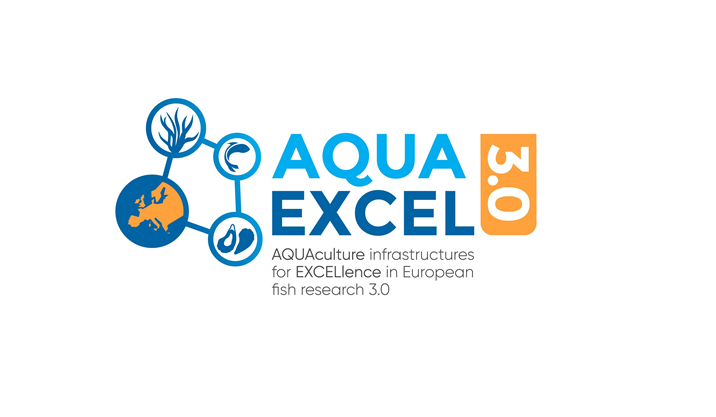
Moderated by Alexandra Neyts, AQUAEXCEL3.0
Selection of case studies with outputs leading to either increased TRL
or with high innovation potential.
AQUAEXCEL3.0 Transnational access high-impact outputs:
- Massimo Orioles: Red Mark Syndrome in rainbow trout: advances in diagnostics and management strategies
- Ricardo Ekmay: Beyond insect flour: use of Wood-Based Yeast SCP (single-cell protein) as an ingredient for Trout diets
- Hijran Yavuzcan: A novel welfare assessment tool for sea-caged European Seabass: the SWIM (Salmon Welfare Index Model) approach
- Raneesha De Fonseka: Triploid salmon: how salinity influences their growth and welfare
- Dinara Bekkozhayeva: No more tags: a novel method to identify fish by using their scale patterns
Discussion chaired by Kjell Maroni, FHF and member of AQUAEXCEL3.0 IRAP
Research-based industry innovations and start-ups:
- Industry innovations: Viking Aqua (AquaBioTech, Shane Hunter)
- Accelerators: Planktonic (Antonio Coli)
- Knowledge and Innovation Community: Next Tuna (Paul Sindilariu)
17:15 Wrap up – with the 4 moderators giving a short summary of their parts.
BEST PRACTICES IN AQUACULTURE
/in _, EU, Events, Workshop /by EATIP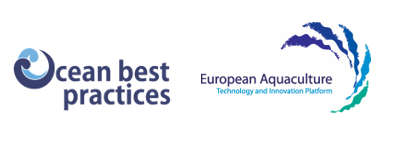
The development of best practices is an important part of the recently launched strategic guidelines for a more sustainable and competitive EU aquaculture. The European Aquaculture Technology and Innovation Platform (EATiP) and the Ocean Best Practices System (OBPS) of the Intergovernmental Oceanographic Commission (IOC) jointly organized this workshop to stimulate sharing of knowledge and to promote best practice development across aquaculture systems and regions in Europe. The aim to consolidate data sharing and best practices relates to a broad range of aquaculture areas such as spatial planning, animal health and welfare, traceability, environmental performance.
The workshop provided the participants with a better understanding of how to develop and maintain best practices within the existing boundaries for sharing of data. It also showed examples of how good practices at a local, regional or EU level can contribute to better aquaculture planning and control. It also looked into opportunities for guidance and collaborative actions on how to support best practices in aquaculture.
5 APRIL 2022 – 13:00 – 16:30 (CEST – UTC+2)
Agenda
- Welcome by EATIP. David Bassett | EATiP
- Welcome by OBPS. Jay Pearlman | OBPS
- Policy and regulations. Lana Bezinovic Sostar | European Commission, DG MARE
- About Best Practices and OBPS. Johannes Karstensen | GEOMAR, IODE OBPS Steering Group
- Aquaculture operations across standards, certification schemes and best practices. Panel dialogue.
- Javier Ojeda | FEAP
- Bruno Guillaumie | EMPA
- Otto Gregussen | Standards Norway
- Best Practices in Aquaculture – use cases across Production System and Regional approaches.
- OPS Seafood – Norway. Edvard Pedersen | The Brønnøysund Register Centre
- PerformFish benchmarking system – Mediterranean. Giovanna Marino | ISPRA
- General Fisheries Commission for the Mediterranean. Houssam Hamza & Linda Fourdain | FAO-NFIGD
- AquaPEF – implementing PEF in aquaculture. Saioa Ramos | AZTI
Break
- Framing the issues on sharing of best practices in aquaculture
- Breakouts for discussion & Report out
- Recommendations
- Adjourn
Aquaculture gets Smart!
/in EU, European Commission, S3 /by David BassettWe are delighted to be working with European Commission DG MARE to co host a brokerage event in Brussels, Belgium, on the topic of Smart Specialisation for a Sustainable Blue Economy
The event will take place on the morning 0f 21 June 2022, with participation free and open to all. Further details follow below.
DG MARE has identified smart specialisation strategies (S3) as a key tool to implement the Communication on Sustainable Blue Economy adopted in May 2021.
Accordingly, in coordination with DG REGIO, DG MARE is setting up a smart specialization platform for sustainable blue economy and is organising a series of brokerage events to promote smart specialisation interregional partnerships and blue economy value chains. EATiP have been pro-actively working with DG MARE since the summer of 2021 to ensure that aquaculture is successfully included in this work.
These events will support matchmaking activities in order to:
- facilitate aquaculture and wider blue economy stakeholders’ networking and exchange
- promote the definition of stakeholders’ complementarities and synergies in terms of interregional value chains/partnerships
- support exchange of potential partnership ideas and expression of interest
- share best practices and lessons learned on S3 interregional partnerships set up and implementation
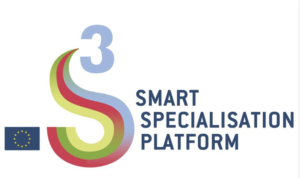
Background to the Overall framework
In May 2021 the Communication on Sustainable Blue Economy (SBE) was adopted as integral part of the European Green Deal.
DG MARE has identified Smart specialisation strategies (S3) as a key tool to implement the Communication. In fact S3 represent a key opportunity, not only to prioritise regional research and innovation investments in blue economy sectors, but also to promote interregional partnerships and blue economy value chains across borders.
Accordingly, DG MARE in cooperation with DG REGIO, is setting up the S3 thematic platform for sustainable blue economy to support interregional partnerships and value chains thus facilitating the cooperation among blue economy 4 helix stakeholders.
Main objective
S3 is a useful tool to support transition towards a sustainable blue economy by creating the necessary innovation ecosystems in Member States and Regions while promoting investments that boost the competitiveness of blue economy sectors.
DG MARE, in cooperation with EATiP is organising this dedicated brokerage session to promote the potentialities of S3 aquaculture interregional partnerships, in particular in the framework of the I3 instrument and the currently open calls.
Target participants
As a multi-stakeholder platform for promotion innovation and research in aquaculture, EATiP is ideally placed to reach out to the target audience for this event. The brokerage session seeks participation from all actors that are part of the smart specialisation quadruple helix stakeholders’ matrix: regional and national authorities, SMEs/start-ups/industry, clusters/business hubs, universities and research institutes, innovation and technological transfer entities and experts on technological transfer/ internationalisation and scale-up.
EATiP joins the AAC
/in AAC, EU, European Commission /by David BassettFurther to today’s special General Meeting, EATiP is delighted to have been officially welcomed as a member of the AAC – the European Aquaculture Advisory Council. Commenting on the decision, the EATiP President, Gustavo Larrazábal, drew attention to the challenges and opportunities facing European aquaculture, noting: “the cutting edge research and innovation activities for which European aquaculture is justifiably highly regarded will be key in achieving the ambitions for European aquaculture production and realising the targets and objectives that the industry, civil society and regulators aspire to. EATiP stand ready to lend our support to the AAC in their deliberations and to assist wherever possible through our experience, expertise and membership network, highlighting the role that technology, research and innovation may have to play and bringing strategic research and innovation priorities to the fore in considering further development for a sustainable European aquaculture sector.”
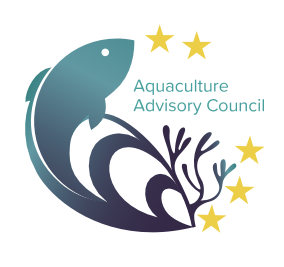
EATiP has been supportive of the establishment of the AAC from the first recommendations for such a Council to be established – as part of the reform of the Common Fisheries Policy in 2013. For some time, EATiP has been operating as an observer at AAC and further to some internal organisational readjustments in 2021, EATiP is now able to commit sufficient staff time and resources to be able to operate as a full and active member of the AAC.
A key factor in the EATiP Boad agreeing this decision was set in the context of the adoption of the Com(2021) 236 – Communication for Strategic guidelines for a more sustainable and competitive EU aquaculture for the period 2021- 2030 and Com(2021) 240 Communication on a new approach to a sustainable blue economy in the EU transforming the EU’s Blue Economy for a Sustainable Future. Within Annex 1 of the Com(2021) 236 (strategic guidelines) a number of points are referenced to the AAC where we feel EATiP will be in a position to assist and collaborate with the AAC and with the European Commission and we look forward to working proactively and productively on this.
Areas of specific interest for EATiP with regard to the AAC and the EU Strategic Guidelines inlcude:
Section 2.4 – Increasing Knowledge and Innovation
- Encourage aquaculture producers and other stakeholders to work together with research and innovation institutes and public authorities to find solutions to the challenges of the sustainable development of EU Aquaculture
- Disseminate information on research and innovation projects and their results among members
- Promote the uptake by the EU aquaculture industry of existing innovation
- Promote in the aquaculture sector the regular training of aquaculture professionals in particular on how to incorporate innovation practices.
Section 2.3 – Ensuring social acceptance and information to the Consumer
- Support and ensure the broad dissemination by members of the coordinated EU-wide campaign on EU aquaculture.
- Promote the use of digitalisation tools and artificial intelligence for the traceability and transparency of aquaculture products.Section 2.2 – Participating in the Green Transition
- Ensure that EU aquaculture producers are informed about relevant research and innovation to improve the environmental performance of aquaculture operations.
- Ensure that EU aquaculture producers are informed about relevant research and innovation on animal welfare.
- Promote the monitoring and reporting by the aquaculture industry of environmental indicators. Section 2.1 – Building Resilience and Competitiveness
- Ensure that EU aquaculture producers are informed about relevant research and innovation on animal-health and public-health matters.
- Encourage the use by the aquaculture sector of digital tools for increased traceability and transparency.
We identify many areas where EATiP will be able to support and assist these ambitions – not only through dissemination and communication with out membership and Mirror Platform Network, but also through inclusion of AAC activities and membership in our online thematic forum events and “On the Horizon” project dissemination service.
The mutual assistance that may be provided between two multi stakeholder organisations such as the AAC and EATiP towards the promotion of a sustainable European aquaculture is clear – and we look forward to a long and fruitful working relationship together!
EESC Opinion supports sustainable Aquaculture growth in Europe
/in BIOECONOMY, EU, European Commission, Media /by David BassettFurther to the publication in the late spring of two key Communications from the European Commission relating to European Aquaculture – on a new approach for a sustainable blue economy in the EU Transforming the EU’s blue economy for a sustainable future – and Strategic guidelines for a more sustainable and competitive EU aquaculture for the period 2021 to 2030 – further support for the sector has been announced in an opinion of the European Economic and Social Committee hearing considering these Communications.
The EESC has indicated support for the efforts and initiatives launched by the European Commission to help our sector grow and become more sustainable, expressing concern that the EU aquaculture sector is not fulfilling its true growth potential. The EESC has expressed further concerns about the fact that 65% of the aquatic products consumed in Europe come from imports.
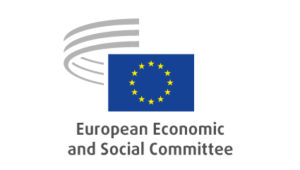
Key points from the EESC opinion include:
- Consumer choices have evolved towards a more nutritional lifestyle, with fish and aquaculture products topping the list. This represents an opportunity for significant growth in the sector, but also a responsibility to ensure future EU food security. Securing safe, healthy and sustainable food in the EU should be one of the top priorities.
- A coordinated effort from the European Commission and the Member States is needed to enhance the production capacity and profitability of the sector. Immediate simplification of administrative procedures must be complemented by high environmental standards, in order to preserve ecosystems and biodiversity, and improve quality of water. The EESC welcomes the Commission’s proposal to set up aquaculture licensing one-stop-shops in all Member States.
- The EESC considers that the right balance needs to be found between preserving the Earth’s biodiversity and meeting the necessary food requirements, taking into consideration social impact, healthy living and environmental protection. Marine and inland waters should be preserved and protected, while promoting sustainable aquaculture activities that would ensure the necessary food for the EU population.
- Space availability represents an important hurdle for the sector’s development. The EESC considers that aquaculture facilities need to be further developed, especially within coastal and rural areas across the Union, in places where other economic activities are not suitable. The EESC calls on the Member States to put in place coordinated spatial planning projects, including sea basin level planning, restoring of abandoned aquaculture facilities and big data analytics systems.
- The EESC believes that the involvement of the social partners and relevant civil society organisations in the future development strategy of the sector will create value added for the Union. They can provide both high-level expertise and excellent communication opportunities.
- The EESC considers that the relationship between the stakeholders along the value chains must be an ethical one. SMEs and start-ups should be fully supported to grow, provide high-quality jobs and create new sustainable economic models, while the public-private partnerships should benefit from financing instruments that cover long-term commitments.
- Educational and vocational training programmes can help meet the sector’s needs for a high-skilled labour force. In this regard, calls for proposals for the aquaculture sector can be financed using the European Social Fund.
- Labelling requirements have a very important role in informing consumers about the quality of aquaculture products. European citizens should be provided with trustworthy information, especially on products that come from countries with little or no legislative framework. Traceability requirements should be processed backwards, down to the hatcheries, for all products in the internal market. The final goal should be a 100% level playing field in the Single Market.
- Communication on the efforts and progress that the sector is making to ensure environmental and climate performance is paramount to ensure social acceptance and familiarise consumers with the efforts being made. Waste management systems are immediately needed for a sector that has a high potential to reduce its environmental footprint. The sector also has considerable potential to embrace circularity and renewable aquatic resources, while striving to reduce energy consumption and carbon emissions.
- Rapid and large-scale public and private investment is needed, especially in research and development activities. The Commission should promote all the relevant available EU funds and partnership opportunities through the social partners and civil society organisations networks, with the final aim of reaching all the producers, especially SMEs.
- The EESC appreciates and supports the proposal to create an EU Aquaculture Assistance Mechanism with a dedicated online platform, and considers that an Aquaculture Growth Strategy that would boost the sector’s potential is urgently needed at European level.


